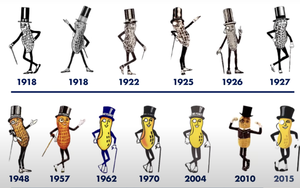brand passion
Hormel Toasts The Mr. Peanut Fan Club
- by Sarah Mahoney @mahoney_sarah, August 12, 2024

America has produced plenty of charismatic brand mascots: Tony the Tiger. The Jolly Green Giant. The Pillsbury Dough Boy. But few have inspired the level of devotion of Mr. Peanut, the swashbuckling character who has been dazzling audiences since 1906.
Hormel, which owns the brand, just released "Legendary Legume: The Peanut Pals and Mr. Peanut," a nine-minute film about the devoted collectors of brand tchotchkes.
There are about 400 Peanut Pals, and the group has been convening three times a year since 1990, crisscrossing the country. Members spend hours scouring flea markets, garage sales, swap meets and online listings for a new Mr. Peanut score and meet frequently to buy, sell and admire their Mr. Peanut products: ads, of course, but mostly merch, like salt-and-pepper shakers, banks, neon signs and even “Mr. Peanut Goes to War” posters from the 1940s.
advertisement
advertisement
They also swap childhood stories about meeting Mr. Peanut, who has traveled the country in Planters’ Nutmobile for decades. And they hope they will pass a love for the character onto the next generation.
The character himself, first sketched by a 14-year-old boy, has gone through plenty of evolutions, says Patrick Horbas, director of marketing for the Planters brand. The top hat, monocle, and cane were soon added. And since then, “Mr. Peanut has changed, maybe 20-plus times over the years. He doesn't completely deviate. He is still a dapper peanut. His emotive characteristics don't change, but his look and feel have been updated.”
The mascot has a long history in advertising, of course, from using Robert Downey Jr. as Mr. Peanut’s first voice, to elaborate Super Bowl stunts. But the Peanut Pals aren’t interested in the brand's marketing per se, instead driven by nostalgia and the quest for stuff.
Horbas points out that what sets Mr. Peanut apart from other brand mascots is “the sheer volume of products that have been made over the years.”

And over the years, he’s developed a distinct kind of personality. Mr. Peanut “means a lot of different things to many other people, but at its core, it's about him bringing joy and a smile, relatability. He's welcoming. It's just something that people have rooted in their personal histories."
Part of that, Horbas tells Marketing Daily, is that people eat more peanuts during the holidays and special moments, making the brand more memorable.
Horbas says that, for the most part, Mr. Peanut's brand awareness equals that of the Planters brand. “The two are inseparable. You'll see him on our product packaging in some way, shape or form everywhere. We keep that connection tight. Mr. Peanut is our biggest distinctive asset. His presence brings his kind of seal of approval.”
From a branded perspective, Horbas says Planters remains tops in the marketplace.
Nutrition trends have created a tailwind for the category, with people looking for “real” food to snack on. “People are rejecting more complex products, looking for satiation in foods they understand.”


